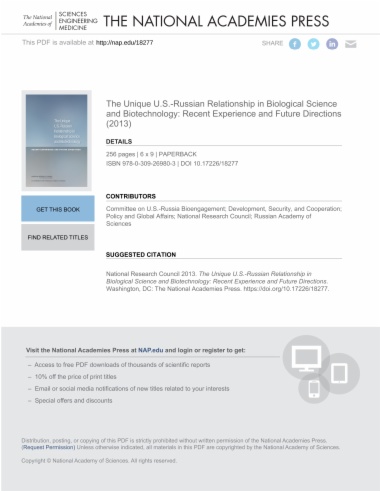In the fall of 2010, the U.S. National Academies (consisting of the National Academy of Sciences, the National Academy of Engineering, and the Institute of Medicine) and the Russian Academy of Sciences (in cooperation with the Russian Academy of Medical Sciences and the Russian Academy of Agricultural Sciences) initiated a joint study of U.S.-Russian bilateral engagement in the biological sciences and biotechnology (hereinafter collectively referred to as bioengagement). The U.S. Department of State and the Russian Academy of Sciences provided support for the study. The academies established a joint committee of 12 leading scientists from the two countries to assess bioengagement activities since 1996 and to provide recommendations as to collaborative efforts in the near future. The Unique U.S.-Russian Relationship in Biological Science and Biotechnology: Recent Experience and Future Directions summarizes the principal conclusions and recommendations of the study.
- Cover
- Front Matter
- Summary
- Introduction
- 1 Importance of U.S.-Russian Bioengagement
- 2 Ensuring Appropriate Use of Biological Assets
- 3 Advancing the Frontiers of Biological Research
- 4 Applications of Science in the Public and Private Sectors
- 5 Programs with Regional and Global Reaches
- 6 Impacts of Bilateral Programs and Projects
- 7 Impediments in Carrying Out Approved and Funded Collaborative Projects
- 8 Lessons Learned
- 9 Strategies and Coordination
- 10 Recommendations for Future Bioengagement
- Appendix A: Available Resources
- Appendix A.1: Biographical Sketches of Committee Members
- Appendix A.2: Relevant Reports of National Academies, Books, and Other Publications
- Appendix A.3: Organizations Consulted
- Appendix B: Examples of U.S.-Russian Agreements of Special Relevance for Bioengagement
- Appendix C: Activities in Bioengagement of Selected U.S. Government Departments and Agencies
- Appendix C.1: Department of State
- Appendix C.2: Defense Threat Reduction Agency
- Appendix C.3: Department of Energy
- Appendix C.4: Department of Health and Human Services (Biotechnology Engagement Program)
- Appendix C.5: National Institutes of Health
- Appendix C.6: Centers for Disease Control and Prevention
- Appendix C.7: National Science Foundation
- Appendix C.8: United States Agency for International Development
- Appendix C.9: Environmental Protection Agency
- Appendix C.10: Agricultural Research Service
- Appendix C.11: Fish and Wildlife Service
- Appendix D: Interest of Selected Russian Research Institutions with Active Bioengagement Programs
- Appendix D.1: State Research Center of Virology and Biotechnology Vector
- Appendix D.2: All-Russian Research Institute of Phytopathology
- Appendix D.3: Research Institute of Influenza
- Appendix D.4: Selected Institutes of the Siberian Branch of the Russian Academy of Sciences
- Appendix E: Activities of Other Organizations
- Appendix E.1: Bilateral Presidential Commission
- Appendix E.2: International Science and Technology Center
- Appendix E.3: Skolkovo Foundation and Innovation Center
- Appendix E.4: Skolkovo Institute of Science and Technology
- Appendix E.5: Rusnano and Other Russian Investors
- Appendix F: Other Topics of Interest
- Appendix F.1: U.S.-Russian Joint Peer-Reviewed Articles, Reviews, and Conference Proceedings (At least one Russian and one American author) (20002012)
- Appendix F.2: Russian Research Personnel and Funding
- Appendix F.3: Russia's Pharmaceutical and Biotechnology Sectors
- Appendix F.4: Assessment of Developments in Agrobiotechnology in the United States and Russia
- Appendix F.5: Scientific Forum for Biomedical and Behavioral Research
- Appendix F.6: Funding and Related Mechanisms

